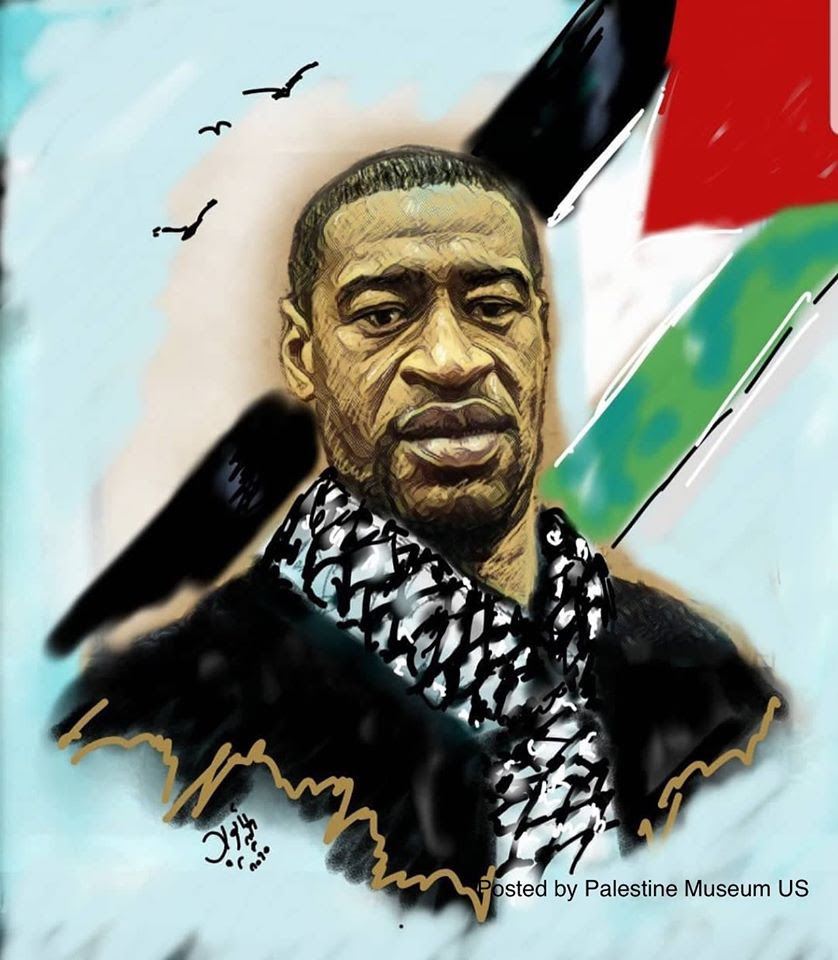by Dr. Asaf Romirowsky
We are now seeing a conjoining of black American politics with Palestinian thinking, which is itself consumed by identity politics.

Painting by Waleed Ayyoub of George Floyd in kaffiya in front of Palestinian flag,
via Palestine Museum US Twitter feed
BESA Center Perspectives Paper No. 1,609, June 18, 2020
EXECUTIVE SUMMARY: The recent riots in the
US underscore how identity politics have been hijacked by red and green
alliances between socialist and Islamist ideologies. We are now seeing a
conjoining of black American politics with Palestinian thinking, which
is itself consumed by identity politics.
It didn’t take long after the riots began across
the US to hear expressions of solidarity from Palestinians in both the
Middle East and the US connecting the horrific killing of George Floyd
to the Palestinian tale. Palestinian artist Waleed Ayyoub illustrated
the connection by painting and posting on the US Twitter feed of the
Palestine Museum a picture of George Floyd dressed in a kaffiya in front of a banner of the Palestinian flag.
Palestinians claim that the killing of Floyd, as
well as the subsequent violent exchanges between US military and police
forces and protesters, show that Israel exports its “racism” to US
police departments. The US Campaign for Palestinian Rights (USCPR)
tweeted to its 51,000 followers, “The Israeli military trains US police
in racist and repressive policing tactics, which systematically targets
black and brown bodies.”
The red and green alliance between socialist and
Islamist ideologies strengthened in parallel with the rise of the idea
of intersectionality. Both ideologies are heavily laden with hatred of
Israel, as became obvious during the latest rioting.
The best example of this phenomenon is the
labeling of the current American reality as an intifada. The Arabic
term, which literally means “uprising,” was first used during the 1987
popular revolt against Israel. It is translated by Arab-Palestinians as
“awakening.” It is used in the Palestinian narrative in the sense of
“waking up” Israel and the world at large to all the wrongs supposedly
done to the Palestinians as a result of the so-called Israeli
“occupation.” The late founder of the PLO, Yasser Arafat, used more
colorful analogies, saying an intifada is the movement a dog makes when
trying to get rid of a tick.
Rami Khouri, a journalism professor at the
American University in Beirut, didn’t waste any time and declared the US
riots an “American intifada.” He rationalized that “in the Arab world,
there’s an inability to address the structural oppression of most
citizens by an elite that has become very wealthy but is totally
detached from their people. You’re seeing the same thing in the US.
There’s an inability to address its structural racism.”
The adaptation of the term is not new, but it is
revealing of the American political and cultural landscape in that it
shows where the Palestinian cause sits in the intersectional pyramid. It
appears to be the gold standard of (supposed) oppression, and is thus
eagerly coopted by other causes rooted in identity politics.
This has long been visible in American
institutions of higher education. Back in 2004, Hatem Bazian, director
of the Islamophobia Research and Documentation Project at the Center for
Race and Gender at the University of California, Berkeley, said:
Well, we’ve been watching intifada in Palestine, we’ve been watching an uprising in Iraq, and the question is, what are we doing? How come we don’t have an intifada in this country?Because it seem[s] to me that we are comfortable in where we are, watching CNN, ABC, NBC, Fox … giving us a window to the world while the world is being managed from Washington, from New York … every one of those lying, cheating, stealing, deceiving individuals are in our country and we’re sitting here and watching the world pass by, people being bombed, and it’s about time that we have an intifada in this country that change[s] fundamentally the political dynamics in here.And we know every—They’re gonna say some Palestinian being too radical—well, you haven’t seen radicalism yet!
Then there is Yvonne Yazbeck Haddad, a professor
of the History of Islam and Christian-Muslim Relations at Georgetown
University, who explained simply that “Intifada is something that
Muslims and Palestinians all approve of. It means ‘just get off my
back.’”
Freedom of speech and religion in addition to the
right to assemble and protest are all positive attributes and
cornerstones of American democracy that should be embraced. But we need
to be clear about the goals and objectives of intifada. Intifada by
design has a violent terrorist agenda that has been demonstrated by the
level of violence used against Israelis for over three decades. It is a
mechanism that justifies all violence in the name of “resistance,” and
has justified continued violence. One of the mistakes Israel has made is
acceding to the adoption of the term to describe its ongoing conflict
with the Palestinians. By incorporating an Arabic term with clear goals
into the Israeli political and cultural vernacular, Israel has, in
effect, legitimated the Palestinian point of view.
The American democracy is far from perfect, but it
remains the best system we have. America is not the Middle East; nor is
it looking to transform itself into it. Using the Israel-Palestinian
conflict as a façade or deflection, or trying to link radical ideologies
on the hard left and right, has become the basis for the red and green
alliance. Doing so only creates distortion.
Working to uproot all forms of racism is
undoubtedly needed in the US, but antisemitism is another form of
racism. Calling for intifada—in other words, calling for war—is the
polar opposite of what Americans of any color should be doing.
Source: https://besacenter.org/perspectives-papers/american-intifada-riots/
Follow Middle East and Terrorism on Twitter
No comments:
Post a Comment